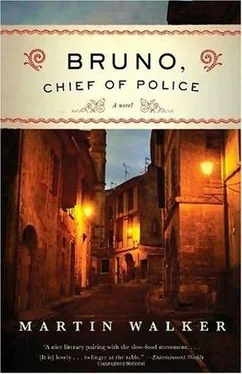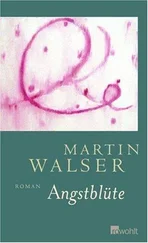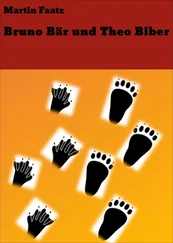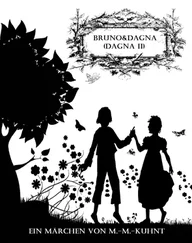Martin Walker - Bruno, chief of police
Здесь есть возможность читать онлайн «Martin Walker - Bruno, chief of police» весь текст электронной книги совершенно бесплатно (целиком полную версию без сокращений). В некоторых случаях можно слушать аудио, скачать через торрент в формате fb2 и присутствует краткое содержание. Жанр: Полицейский детектив, на английском языке. Описание произведения, (предисловие) а так же отзывы посетителей доступны на портале библиотеки ЛибКат.
- Название:Bruno, chief of police
- Автор:
- Жанр:
- Год:неизвестен
- ISBN:нет данных
- Рейтинг книги:3 / 5. Голосов: 1
-
Избранное:Добавить в избранное
- Отзывы:
-
Ваша оценка:
- 60
- 1
- 2
- 3
- 4
- 5
Bruno, chief of police: краткое содержание, описание и аннотация
Предлагаем к чтению аннотацию, описание, краткое содержание или предисловие (зависит от того, что написал сам автор книги «Bruno, chief of police»). Если вы не нашли необходимую информацию о книге — напишите в комментариях, мы постараемся отыскать её.
Bruno, chief of police — читать онлайн бесплатно полную книгу (весь текст) целиком
Ниже представлен текст книги, разбитый по страницам. Система сохранения места последней прочитанной страницы, позволяет с удобством читать онлайн бесплатно книгу «Bruno, chief of police», без необходимости каждый раз заново искать на чём Вы остановились. Поставьте закладку, и сможете в любой момент перейти на страницу, на которой закончили чтение.
Интервал:
Закладка:
If they leant on Karim and Rashida to start talking, there was no telling where it might end. Criminal damage to state property would mean an end to Karim’s licence to sell tobacco, and the end of his cafй. He might not talk, but Rashida would be thinking of the baby and she might crack. That would lead them to old Joe and to the rest of the rugby team, and before you knew it the whole network of the quiet and peaceful town of St Denis would face charges and start to unravel. Bruno couldn’t have that.
Bruno carefully slowed his pace as he turned the corner by the Commune notice board and past the war memorial into the ranks of cars that were drawn up like so many multi-coloured soldiers in front of the Crйdit Agricole. He looked for the gendarme Twingo and then saw Duroc standing in the usual line in front of the bank’s cash machine. Two places behind him was the looming figure of Karim, chatting pleasantly to Colette from the dry cleaning shop. Bruno closed his eyes in relief, and strode on towards the burly North African.
‘Karim,’ he said, and swiftly added ‘Bonjour, Colette,’ kissing her cheeks, before turning back to Karim, saying, ‘I need to talk to you about the match schedule for Sunday’s game. Just a very little moment, it won’t take long.’ He grabbed him by the elbow, made his farewells to Colette, nodded at Duroc, and steered his reluctant quarry back to the bridge.
‘I came to warn you. I think they may have the car staked out, maybe even tipped off the gendarmerie,’ Bruno said. Karim stopped, and his face broke into a delighted smile.
‘I thought of that myself, Bruno, then I saw that new gendarme standing in line for cash, but his eyes kept moving everywhere so I waited behind him. Anyway, it’s done.’
‘You did the tyres with Duroc standing there!?’
‘Not at all.’ Karim grinned. ‘I told my nephew to take care of it with the other kids. They crept up and jammed a potato into the exhaust pipe while I was chatting to Colette and Duroc. That car won’t make ten kilometres before the engine seizes.’
CHAPTER 3
As the siren that sounded noon began its soaring whine over the town, Bruno stood to attention before the Mairie and wondered if this had been the same sound that had signalled the coming of the Germans. Images of ancient newsreels came to mind: diving Stukas, people dashing for aid raid shelters, the victorious Wehrmacht marching through the Arc de Triomphe in 1940 to stamp their jackboots on the Champs-Elysйes and launch the conquest of Paris. Well, he thought, this was the day of revenge, the eighth of May, when France celebrated her eventual victory, and although some said it was old-fashioned and unfriendly in these days of Europe, the town of St Denis remembered the Liberation with an annual parade of its venerable veterans.
Bruno had posted the Route Barrйe signs to block the side road and ensured that the floral wreaths had been delivered. He had donned his tie and polished his shoes and the peak of his cap. He had warned the old men in both cafйs that the time was approaching and had brought up the flags from the cellar beneath the Mairie. The Mayor himself stood waiting, the sash of office across his chest and the little red rosette of the Lйgion d’Honneur in his lapel. The gendarmes were holding up the impatient traffic, while housewives grumbled that their bags were getting heavy and kept asking when they could cross the road.
Jean-Pierre of the bicycle shop carried the tricolore and his enemy Bachelot held the flag that bore the Cross of Lorraine, the emblem of General de Gaulle and Free France. Old Marie-Louise, who as a young girl had served as a courier for one of the Resistance groups and who had been taken off to Ravensbruck concentration camp and somehow survived, sported the flag of St Denis.
Montsouris, the Communist councillor, carried a smaller flag of the Soviet Union, and old Monsieur Jackson – and Bruno was very proud of arranging this – held the flag of his native Britain. A retired schoolteacher, he had come to spend his declining years with his daughter who had married Pascal of the local insurance office. Monsieur Jackson had been an eighteen-year-old recruit in the last weeks of war in 1945 and was thus a fellow combatant, entitled to share the honour of the victory parade. One day, Bruno told himself, he would find a real American, but this time the Stars and Stripes were carried by young Karim as the star of the rugby team.
The Mayor gave the signal and the town band began to play the Marseillaise.
Jean-Pierre raised the flag of France, Bruno and the gendarmes saluted, and the small parade marched off across the bridge, their flags flapping bravely in the breeze. Following them were three lines of the men of St Denis who had performed their military service in peacetime but who turned out for this parade as a duty to their town as well as to their nation. Bruno noted that Karim’s entire family had come to watch him carry a flag. At the back marched a host of small boys piping the words of the anthem. After the bridge, the parade turned left at the bank and marched through the car park to the memorial, a bronze figure of a French poilu of the Great War. The names of the fallen sons of St Denis took up three sides of the plinth beneath the figure. The bronze had darkened with the years, but the great eagle of victory that was perched, wings outstretched, on the soldier’s shoulder gleamed golden with fresh polish. The Mayor had seen to that. The plinth’s fourth side was more than sufficient for the dead of the Second World War, and the subsequent conflicts in Vietnam and Algeria. There were no names from Bruno’s own brief experience of war in the Balkans. He always felt relieved by that, even as he marvelled that a Commune as small as St Denis could have lost over two hundred young men in the slaughterhouse of 1914-1918.
The schoolchildren of the town were lined up on each side of the memorial, the infants of the Maternelle in front sucking their thumbs and holding each other’s hands. Behind them, the slightly older ones in jeans and T-shirts were still young enough to be fascinated by this spectacle. Across from them, however, some of the teenagers of the Collиge slouched, affecting sneers and a touch of bafflement that the new Europe they were inheriting could yet indulge in such antiquated celebrations of national pride. But Bruno noticed that most of the teenagers stood quietly, aware that they were in the presence of all that remained of their grandfathers and great-grandfathers, a list of names on a plinth that said something of their heritage and of the great mystery of war, and something of what France might one day again demand of her sons.
Jean-Pierre and Bachelot, who might not have spoken for fifty years but who knew the ritual of this annual moment, marched forward and lowered their flags in salute to the bronze soldier and his eagle. Montsouris dipped his red flag and Marie-Louise lowered hers so far it touched the ground. Belatedly, unsure of their timing, Karim and the English Monsieur Jackson followed suit. The Mayor walked solemnly forward and ascended the small dais that Bruno had placed before the memorial.
‘Franзais et Franзaises,’ he declaimed, addressing the small crowd. ‘Frenchmen and Frenchwomen, and the representatives of our brave allies. We are here to celebrate a day of victory that has also become a day of peace, the eighth of May that marks the end of Nazism and the beginning of Europe’s reconciliation and her long, happy years of tranquillity. That peace was bought by the bravery of our sons of St Denis whose names are inscribed here, and by the old men and women who stand before you and who never bowed their heads to the rule of the invader. Whenever France has stood in mortal peril, the sons and daughters of St Denis have stood ready to answer the call, for France, and for the Liberty, Equality and Fraternity and the Rights of Man for which she stands.’
Читать дальшеИнтервал:
Закладка:
Похожие книги на «Bruno, chief of police»
Представляем Вашему вниманию похожие книги на «Bruno, chief of police» списком для выбора. Мы отобрали схожую по названию и смыслу литературу в надежде предоставить читателям больше вариантов отыскать новые, интересные, ещё непрочитанные произведения.
Обсуждение, отзывы о книге «Bruno, chief of police» и просто собственные мнения читателей. Оставьте ваши комментарии, напишите, что Вы думаете о произведении, его смысле или главных героях. Укажите что конкретно понравилось, а что нет, и почему Вы так считаете.












